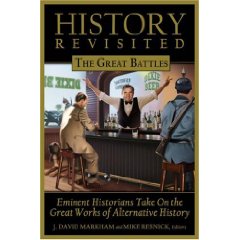History Revisited – The Great Battles – Book Review
 History Revisited: The Great Battles: Eminent Historians Take On the Great Works of Alternative History. By J. David Markham (Editor), Mike Resnick (Editor). Publisher: Benbella Books (March 1, 2008). Paperback: 312 pages. $17.95.
History Revisited: The Great Battles: Eminent Historians Take On the Great Works of Alternative History. By J. David Markham (Editor), Mike Resnick (Editor). Publisher: Benbella Books (March 1, 2008). Paperback: 312 pages. $17.95.
Overall, the book is a good read and quite educational.
I admit it: I am a sucker for alternative history. I have always liked the “what if” that the masters of the genre are able to twist into a truly credible story. History Revisited: The Great Battles edited by J. David Markham and Mike Resnick is a collection in which—as the book says—“eminent historians take on the great works of alternative history."
{default}This book is not for the faint of heart or those who want the simple alternative history of what would have happened if the Confederates had been victorious at Gettysburg. Instead, it looks at what could have happened if Lincoln had been killed by a rebel sharpshooter on the walls of Fort Stephens; the changes to history if Napoleon had faced the troops of Wellington and the fleet of Nelson at the Battle of New Orleans; the outcome of the naval clashes of the Napoleonic wars if Admiral Nelson, having been shipwrecked and rescued by the French years earlier, wears the uniform of the upstart French Republic; and other topics that are much deeper than the usual fare.
The list of contributing authors is impressive, with Michael F. Flynn (longtime editor of Analog and author of Eifelheim), Kim Stanley Robinson (author of the Mars Trilogy) and Harry Turtledove (author of numerous alternative histories) among them. What sets this book apart is that after each short story, an essay discusses the true history and how the story previously told could have come to pass. The writers of these essays are not your run-of-the-mill authors; rather, they are people with education in the area that they are commenting on. This added depth helps to acquaint the reader with the situations presented and the history that has been changed. This is important, as some of the short stories are very different than I was used to.
An example of this is Michael Flynn’s story set in the middle of a divided U.S. with peacekeepers from Europe in place to stop the genocide in Selma. In this alternate history, Adlai Stevenson is cast as a man trying to broker a deal between Northern Democrats and Southern Democrats. Also in the story are a militant Martin Luther King, an unrepentant George Wallace and “Tricky Dick” the guerilla-leader. The story shows how a small change in an earlier time could have huge ripples later—in this case the fact that the U.S. didn’t enter the Great War. This ripple in time is not one I would have ever conceived of and makes for a very entertaining read.
Among the more obscure topics is Alcibiades’ sack of Syracuse and Kenya’s fight for independence from the British. Both are eras of history that I was aware of, but not overly familiar with. The essays after each story helped by putting the story into the history that I was more familiar with and gave each story a bit more emphasis while showing how the history that was could be changed to the history that could be.
Overall, the book is a good read and quite educational. I admit that some of the stories were very deep and were based on situations that I wasn’t familiar with, but it was an opportunity to learn and gain a better understanding of the past. If you get the chance to read the book, take that opportunity—you won’t regret it.
ACG Intel

